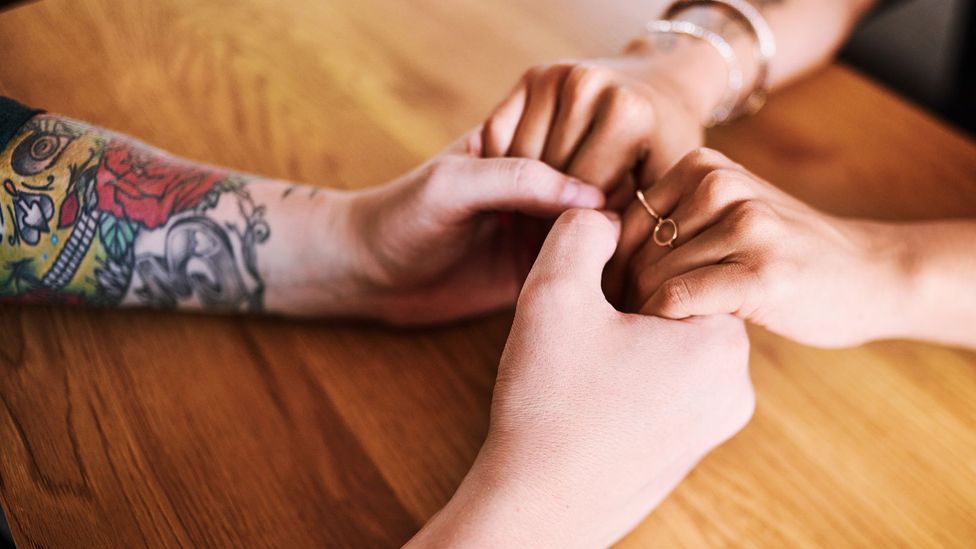Considering the attention given to appearances, and how quickly we form – and stick to – a first impression, it would be easy to assume that looks are what matter most in finding love. But, while physical attraction is coveted, it might really be what's inside that counts.
Appearance and sexiness rank middling on surveys of people's preferred characteristics, with material successes, such as financial security and owning a nice house, among the least important attractive qualities.
Instead, traits like agreeableness, extraversion and intelligence score consistently higher than physical attraction as things that men and women in same-sex and different-sex couples look for in a partner.
In surveys like this, social-desirability bias – or our tendency to give answers which we think make us look good in the eyes of others – might be skewing the results, says Greg Webster, a psychology professor at the University of Florida in the US. This might mean that self-reported surveys present slightly skewed data, but even so, people typically say they prefer qualities like intelligence to looks.
But when presented with a real-life date do we still choose personality over looks?
According to Jess Alderson, co-founder of the dating app So Syncd, which requires users to complete a psychometric test to measure personality traits, we do. Of a sample of more than 1,000 users made available to BBC Future, almost 90% preferred personality over looks.

More agreeable people tend to see other people as kind and friendly, research suggests (Credit: Getty Images)
Measuring someone's personality can be tricky. Psychometric tests, which usually take the form of a questionnaire, have been used for decades in psychiatry as a way to quantify personality. (These tests tend to measure how much people agree with statements like "I'm the life and soul of the party".)
Psychologists often use the Big Five test, which measures people on five traits – openness to new experiences, conscientiousness, extraversion, agreeableness and neuroticism. These five traits are thought to be quite common, but the Big Five is not without criticism. Looking only at five traits presents quite a limited view of what makes people tick, says Webster.
While imperfect, psychometric tests can show similarities and differences between people, and can paint broad pictures of people's personalities. And some parts of our personalities do seem to be better indicators of how suitable we are for serious relationships.
Of the Big Five, agreeableness, which is an indicator of someone's interpersonal skills (or how caring and compassionate they are), plays a strong role for both sexes in the initial assessment of a date's desirability, is the strongest predictor of current and future relationship satisfaction, and the only significant predictor of relationship dissolution. For both men and women, physical attractiveness must be coupled with agreeableness to predict desire for a serious relationship.
Being a nice person is "indispensable for harmonious long-term relationships", says Webster. "Agreeableness is kind of a necessity," he says, adding that entering into a relationship with someone you thought was unkind would be problematic.
Webster says that our perception of our own and other people's personalities are shaped by our frame of reference. More agreeable people, for example, tend to see other people as kind and friendly, and vice versa, and we are attracted to people who share similar values to us. It might be the case then that we match with people who have very similar personalities to ourselves.
excitement," says Alderson. "I would caveat this by saying that any personality type pairing can work and there are definitely advantages and challenges to each. If you are too similar, it can be a little bit boring. And then if you're too different, it can just not be that fun on a daily basis."
In relationships, agreeableness coupled with other attractive traits can bring the best out of people, says Webster. In a study he co-authored with social psychologists Angela Bryan and Amanda Mahaffey, Webster looked at socially, physically and financially dominant people and the effect agreeableness had on their appeal.
All three of these types of dominance are attractive, the researchers say, as each offers a kind of protection or access to basic needs, like food and shelter, through to more desirable needs, like lavish lifestyles. But, dominance can be used for good and bad.
"We can think about dominance as being turned inward towards a relationship or dominance being focused outward away from the relationship," says Webster. "What people want are partners who are socially, physically or financially dominant, but not necessarily towards their partner."
Dominance mediated by agreeableness is an appealing combination, he adds. "It's one thing if you're able to dominate other people, but are you willing to share those resources with your romantic partner?"
When it comes to finding the right match, says Webster, agreeableness accentuates the benefits of other parts of our personalities. It really could pay to be kind after all.